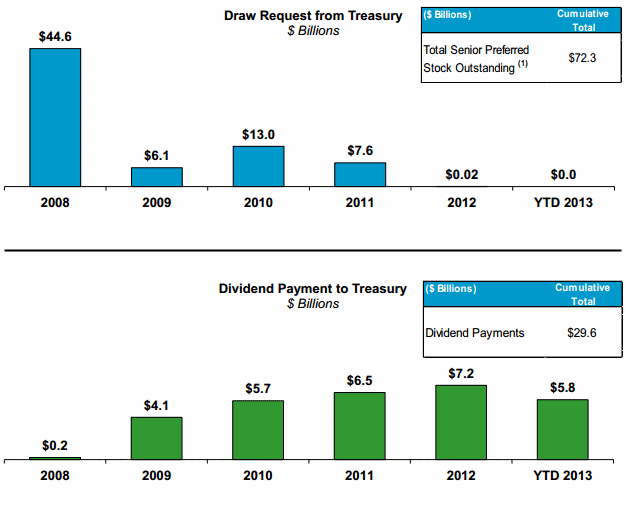Freddie Mac is reporting that it earned net income of $4.6 billion in the first quarter of 2013, the second largest amount in the company's history, compared to $4.5 billion in the fourth quarter of 2012. Comprehensive income was $7.0 billion, up from 5.7 billion the previous quarter. The company will require no draw from the U.S. Treasury for the quarter and will pay a dividend to the Treasury of $7.0 billion based on its net worth of $10.0 billion on March 31.
Net interest income was $4.3 billion, provision for credit losses of $0.5 billion, derivative gains of $0.4 billion and other non-interest income of $0.1 billion. Non-interest expenses were $(06) billion. The increase of $124 million in net income for the quarter was primarily due to net security impairments (which improved from ($1.2) billion to ($0.0) billion) partially offset by lower income tax benefits.
Total other comprehensive income was $2.4 billion compared to $1.3 billion primarily due to higher fair value gains on Freddie Mac's non-agency AFS securities due to spread tightening.
Freddie Mac has received support from the U.S. Treasury totaling $71.3 billion since entering federal conservatorship in September 2008. Under a senior stock purchasing agreement with Treasury $140.5 billion remains available for further draws to enable the company to maintain access to debt markets and have adequate liquidity to conduct normal operations. Freddie Mac has not made a Treasury draw since the first quarter of 2012.
Under an amendment made to the purchasing agreement as of January 1 Freddie Mac is no longer allowed to hold a cash reserve. All of the company's net worth at the end of a quarter that exceeds an applicable capital reserve amount (currently $3.0 billion) will be "swept" into a Treasury account as a dividend. The sweep was $5.8 billion in March and today's earning's report announced an increase to $7 billion in June.
Under the purchase agreement, the payment of dividends cannot be used to offset prior Treasury draws. Accordingly, while Freddie Mac has paid aggregate cash dividends to Treasury of $29.6 billion through March 31, 2013 Treasury still maintains a liquidation preference of $72.3 billion on the company's senior preferred stock as of March 31, 2013.

During the quarter Freddie Mac provided financing for 96,000 home purchases ($21 billion), 197,000 relief refinances including HARP ($33 billion), and 343,000 other refinances ($78 billion). It also provided financing for 87,000 multi-family housing units ($6 billion).
The company said it also helped 46,000 households avoid foreclosure through 21,000 loan modifications, 8,000 repayment plans, 3,000 forbearance agreements, and 14,000 short sales or deeds-in-lieu of foreclosure transactions.
Freddie Mac said the quality of its loan portfolio continues to improve. At the end of the first quarter the single-family serious delinquency rate was 3.03 percent compared to 3.25 percent at December 31, 2012. While the company's single-family serious delinquency rate remains higher than the rate in years prior to 2009, it is substantially below the rate for the entire U.S. mortgage market. According to the Mortgage Bankers Association's National Delinquency Survey, the serious delinquency rate on first-lien single-family loans in the U.S. mortgage market was 6.78 percent at December 31, 2012, which is the most recent date for which data is available.
Multifamily delinquency rate (based on loans 60 days or more past due or in the process of foreclosure) was 0.16 percent at March 31, 2013, compared to 0.19 percent at December 31, 2012, reflecting continued positive multifamily market fundamentals.







